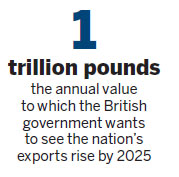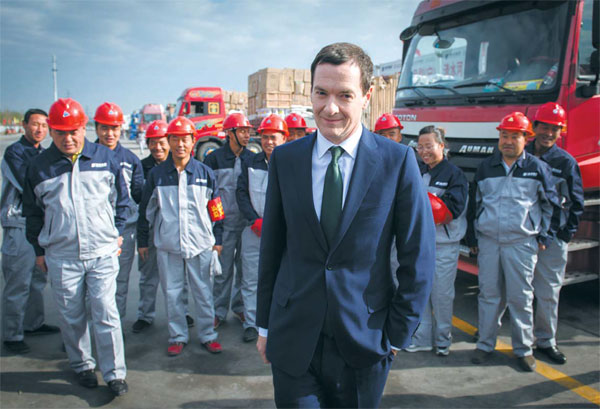UK chancellor's China visit boost for relations, analysts say
Updated: 2015-10-16 08:15
By Cecily Liu(China Daily Europe)
|
|||||||||||
Delegation led by George Osborne, who made his first visit to Xinjiang, highlighted opportunities for closer collaboration
British Chancellor George Osborne's visit to China in September, which included his first trip to the country's northwest, has helped strength the countries' economic and financial ties, analysts say.
Osborne led a business and culture delegation on a weeklong tour, stopping in Beijing, Shanghai and the Xinjiang Uygur autonomous region.
|
UK Chancellor of the Exchequer George Osborne visits an industrial area in Urumqi in Xinjiang. Provided to China Daily |
While in Xinjiang, he announced that Hualing Industry and Trade Group, a local company, had agreed to be part of the United Kingdom's Northern Powerhouse strategy. He said the company will invest in three property projects worth a combined 1.2 billion pounds ($1.8 billion; 1.6 billion euros).
"China's emerging regions, like Xinjiang, hold enormous potential in the years ahead," Osborne said during his visit.
"We're building an ever-closer relationship with China. It's a partnership that is set to unleash growth and help regions like Xinjiang, where we know investment can make a real difference, as well as unleash new growth back home in places like our Northern Powerhouse," he added, referring to his government's initiative to revitalize the country's north.
According to the agreement, Hualing will invest in Middlewood Locks, a 730-million-pound project in Salford with 2,000 residential units and about 69,600 square meters of commercial space; Thorpe Park, a 400-million-pound mixed-use project in Leeds; and Sheffield Digital Campus, a 40-million-pound commercial and office development.
The projects, led by Scarborough Group, a British firm, are expected to create 18,000 jobs and enable the delivery of 10,000 new homes.
The British government is aiming to make China its second-largest trading partner by 2025, potentially adding billions to the economy, as part of wider efforts to increase the annual value of the nation's exports to 1 trillion pounds and to get 100,000 more British companies exporting goods.
Analysts say Osborne's visit to Xinjiang was an attempt to broaden trade and investment links with Chinese cities.
"In many ways the industrial diversity of Chinese cities resembles the makeup of the UK," says Max Steinberg, chairman of the International Festival for Business 2016. "Just as Britain is about much more than London, with major industrial hubs in Liverpool, Manchester and Birmingham, China has more to offer beyond Beijing and Shanghai."
The festival is a 50-day periodic event hosted in Liverpool over the summer. Steinberg last chaired the festival in 2014 when the project generated more than 300 million pounds worth of deals and helped create more than 10,000 jobs. He says Osborne's trip was a hugely significant step for British-Chinese trade relations.
"The relationship will unleash growth for both parties, helping regions like Xinjiang, where investment can make a real difference, and unleashing new growth in places such as Britain's Northern Powerhouse," he says.

Tim Summers, a senior consulting fellow at the think tank Chatham House, says it is important that the UK engages with more Chinese cities and provinces, given the extent of the country's development and economic diversity.
"Many (cities) have significant economies and populations in their own right and have different connections with the global economy," he says. "The chancellor's interest in traveling more widely in China is a good response to this trend."
He says the countries' cooperation in infrastructure can lead to benefits for both sides, helping Chinese companies develop global profiles and supporting the UK's demand in these areas.
However, Summers adds that it is important that projects are carefully managed to ensure the sustainability of infrastructure collaboration.
The Northern Powerhouse, a strategy to boost economic growth in northern England, particularly in Liverpool, Manchester, Leeds and Sheffield, has been based on urban agglomeration and aims to rebalance the British economy away from London and the southeast.
Steinberg says the initiative embodies the diversity of the British economy and that the International Festival for Business 2016 will showcase opportunities that exist across the UK, including those related to the Northern Powerhouse.
Another key point of Osborne's Xinjiang visit was his attempt to get the UK involved in China's Belt and Road Initiative, which aims to create a Silk Road Economic Belt and a 21st Century Maritime Silk Road. The region is expected to play a big part in the new trade routes, with Urumqi, the provincial capital, gearing up to become a major transport and logistics hub for Central Asia as well as a center for healthcare, finance, education and culture.
To make the initiative a reality, China has already allocated about $100 billion in funding, including $40 billion to the Silk Road Fund, which is focused on Central Asia; $50 billion to the new Asian Infrastructure Investment Bank; and $10 billion to the BRICS-led New Development Bank.
While in Urumqi, Osborne unveiled a study by the China-Britain Business Council and the Foreign Office on the Belt and Road Initiative that included advice for British companies on potential funding streams, including those created by the Asian Infrastructure Investment Bank, which the UK joined as a prospective founding member this year.
Summers says the chancellor's visit to Xinjiang sent a message that the British government is positive about the initiative. "Xinjiang is a core area for the development of the Silk Road Economic Belt and one that has been looking to develop closer economic links with Central Asia for many years," he says.
During his China visit, Osborne also visited Chengdu, the capital of Sichuan province, and attended the UK-China Economic and Financial Dialogue in Beijing.
He was joined by Jim O'Neill, the commercial secretary to the Treasury and an expert on the Chinese economy, as well as Business Secretary Sajid Javid, Energy Secretary Amber Rudd, Communities Secretary Greg Clark, Minister for Small Business Anna Soubry and City Minister Harriett Baldwin. Also in the delegation were culture industry leaders, including Neil MacGregor, director of the British Museum; Lisa Burger, executive director of the National Theatre; and Tim Smit, founder of the Eden Project, an eco-based visitor attraction in Cornwall.
cecily.liu@mail.chinadailyuk.com
(China Daily European Weekly 10/16/2015 page19)
Today's Top News
Royal family to gather in strength for Xi
Xi pledges stronger support to rid all Chinese poverty
Xi's trip to herald 'golden decade' for relations
Wanda's Wang again becomes richest Chinese
Ex-NBA star Odom reported critical, Kardashian at his side
Country house to add English tradition to Xi, Cameron meeting
Most Chinese cities failing air quality standards: Report
Xi to initiate 'golden era' in China-UK ties
Hot Topics
Lunar probe , China growth forecasts, Emission rules get tougher, China seen through 'colored lens', International board,
Editor's Picks

|

|

|

|

|

|







